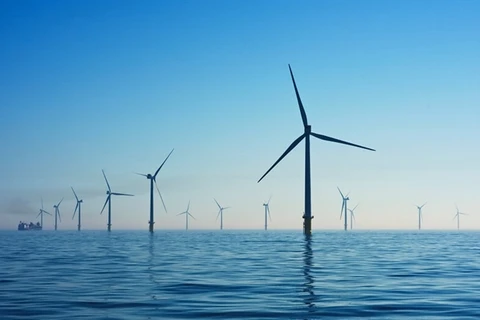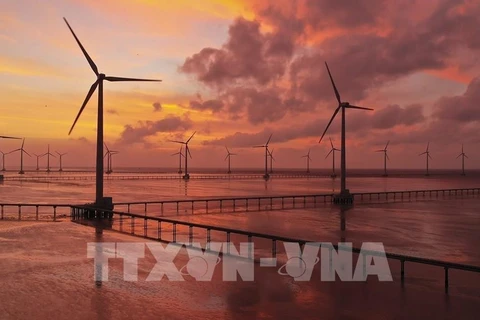Hanoi (VNA) – Vietnam will increase offshore wind power capacity to 4 GW from 1 GW and onshore wind power capacity to nearly 17.34 GW from about 1.26 GW by 2030, according to the latest draft of the National Power Development Plan VIII.
The success of onshore wind power projects can be viewed as a start for the wind power industry in Vietnam, Mathias Hollander, senior manager of the Global Wind Energy Council (GWEC) told a recent meeting held to discuss the draft. The country is facing a big chance to rise to the top of wind power producers, he said.
According to the World Bank (WB)’s Offshore Wind Roadmap for Vietnam, Vietnam can have an offshore win power capacity of 5 – 19 GW by 2030, generating around 60 billion USD in Gross Value Added for the country.
The 5 GW offshore wine power capacity goal is completely feasible, Hollander said, adding that setting an even more ambitious target of 10 GW can boost investors’ confidence, giving further push to the industry.
Given that developing offshore wind power requires big funding and long-term commitment of investors, it is crucial to come up with an ambitious plan, he noted.
Echoing Hollander’s view, Mark Hutchinson, Chair of the GWEC’s Southeast Asia Taskforce, said wind power and other renewables are pivotal solutions to a low-carbon future. He said the GWEC supports Vietnam lifting onshore wind power capacity to 17 GW by 2030 but believed the offshore wind power goal should be higher.
The 10 GW target is achievable based on calculations from the WB report, he stated.
As Vietnam looks to significantly cut coal-fired power production in the future in accordance to the draft of the National Power Development Plan VIII, wind power is deemed as an ideal alternative to fill in the gap.
The use of free and inexhaustible wind resource is expected to protect Vietnam’s energy industry from the uncertainties of the global energy market./.
The success of onshore wind power projects can be viewed as a start for the wind power industry in Vietnam, Mathias Hollander, senior manager of the Global Wind Energy Council (GWEC) told a recent meeting held to discuss the draft. The country is facing a big chance to rise to the top of wind power producers, he said.
According to the World Bank (WB)’s Offshore Wind Roadmap for Vietnam, Vietnam can have an offshore win power capacity of 5 – 19 GW by 2030, generating around 60 billion USD in Gross Value Added for the country.
The 5 GW offshore wine power capacity goal is completely feasible, Hollander said, adding that setting an even more ambitious target of 10 GW can boost investors’ confidence, giving further push to the industry.
Given that developing offshore wind power requires big funding and long-term commitment of investors, it is crucial to come up with an ambitious plan, he noted.
Echoing Hollander’s view, Mark Hutchinson, Chair of the GWEC’s Southeast Asia Taskforce, said wind power and other renewables are pivotal solutions to a low-carbon future. He said the GWEC supports Vietnam lifting onshore wind power capacity to 17 GW by 2030 but believed the offshore wind power goal should be higher.
The 10 GW target is achievable based on calculations from the WB report, he stated.
As Vietnam looks to significantly cut coal-fired power production in the future in accordance to the draft of the National Power Development Plan VIII, wind power is deemed as an ideal alternative to fill in the gap.
The use of free and inexhaustible wind resource is expected to protect Vietnam’s energy industry from the uncertainties of the global energy market./.
VNA

























